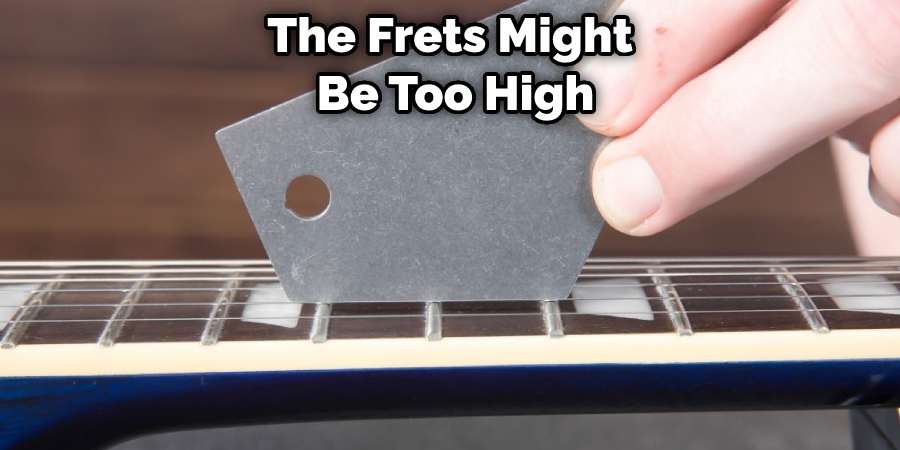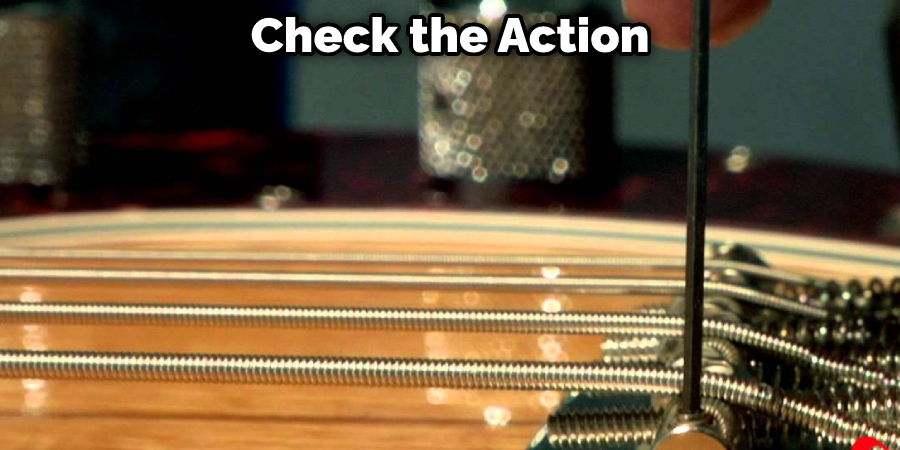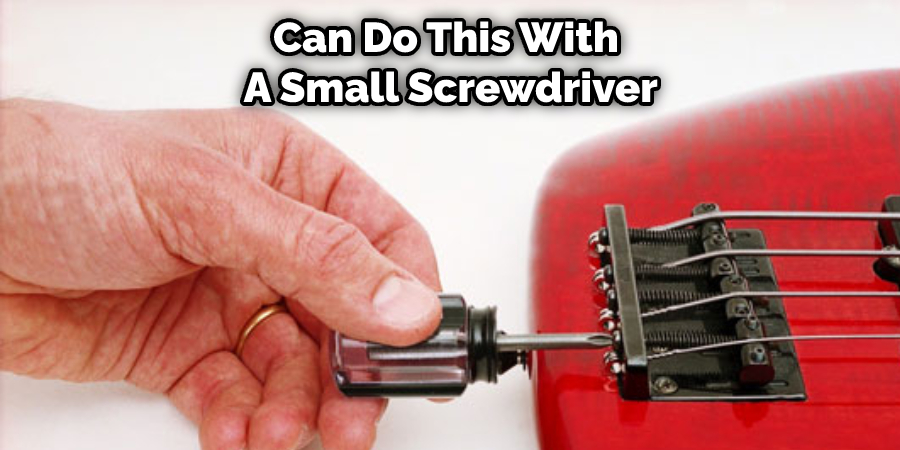Bass players know that fret buzz can be a real headache. It’s not only annoying but also makes it difficult to play your instrument. So in this blog post, we’ll show you how to fix fret buzz on bass. We’ll walk you through the process step-by-step and provide some tips to help you avoid this issue in the future. So whether you’re a beginner or an experienced player, read on for all the necessary information.
Summary: If you’re having trouble with fret buzz on your bass, there are a few things you can do to try and fix the issue. First, make sure your strings are in good condition and haven’t been stretched out too much. Second, make sure you’re using the right string gauge for your bass. And finally, be sure to keep your strings clean and free of dirt and grime.

What Is Fret Buzz?
Before we get into how to fix it, let’s first take a moment to understand what fret buzz is. Simply put, fret buzz is a buzzing sound that occurs when the strings of your bass guitar contact the frets. It can happen when you play a note or even when you’re not playing anything. Fret buzz is usually caused by two things: either the strings are too low, or the frets are too high. If the strings are too low, they can buzz against the frets when you play. This can be adjusted by raising the string height (also known as the action). On the other hand, if the frets are too high, they can cause the strings to buzz even when you’re not playing. Again, this can be fixed by lowering the height of the frets.
Reasons for Fret Buzz on a Bass?
There are a few different reasons why your bass might start buzzing. They are,
The Action Is Too Low
One issue might be that the action is too low. If the strings are too close to the fretboard, they can buzz against the frets when you play. You can adjust the action by raising the string height.
The Frets Are Too High
One other reason for fret buzz is that your frets might be too high. If they’re too close to the strings, they can cause the strings to buzz even when you’re not playing. You can fix this issue by lowering the height of the frets.

The Neck Is Too Straight
If your guitar is suffering from fret buzz, it could be because the neck isn’t curved enough. If the strings can buzz against the frets, it’s because the neck isn’t bent enough. You can check if the neck is too straight by holding the guitar up to a light source. If you can see light shining through at any point along the neck, then the neck is too straight. To fix this problem, you’ll need to have the neck professionally adjusted.
The Truss Rod Is Too Loose
One of the reasons that can cause fret buzz is if the truss rod is too loose. The truss rod is a long metal rod located on the neck which is used to adjust the curvature. If it’s not tightened enough, the neck can become too curved and make the strings buzz against the frets.
A Complete Guide on How to Fix Fret Buzz on Bass
1. Check the Action.
The first thing you should do when you’re experiencing fret buzz is to check the action. The action is the distance between the strings and the frets, and it’s an important factor in how your bass plays. If the action is too high, the strings will be too far from the frets, and you’ll get fret buzz. If the action is too low, the strings will be too close to the frets, and you’ll get fret buzz. The action should be just right so that the strings are close to the frets but not too close.

2. Check the Neck.
If the neck is not straight, it can cause fret buzz. Use a ruler or a Straight Edge to check the neck. Place the ruler on the first fret and measure to the last fret. If there is a gap, then the neck is not straight. If the neck is not straight, it will need to be adjusted by a qualified luthier.
3. Check the Fretboard.
If the fretboard is not level, it can cause fret buzz. Use a small level to check the fretboard. If it is not level, use a thin piece of wood or paper to shim under the low side of the board until it is level. Fretboard levels are available at most music stores. If the frets are too high, it can cause fret buzz. Use a thin straightedge to check the frets for height. clearance. A good rule of thumb is that you should be able to fit a credit card between the top of a fret and the bottom of the string.
4. Check the Truss Rod.
The truss rod is what keeps the neck straight. If it is loose, it can cause fret buzz. Remove the strings and turn the truss rod nut with a wrench or a socket to check the truss rod. If it is loose, tighten it until it is snug. However, do not over-tighten the truss rod, as this can damage the neck.
5. Adjust the Nut Slots.
The nut is what the strings sit in at the headstock end of the neck. If the nut slots are too deep, the string can sit too low and cause fret buzz. If the nut slots are too shallow, the string can sit too high and cause fret buzz.
The fix is to deepen or shallow the relevant nut slots with a sharp knife or file. If you have a lot of fret buzz, all of your nut slots are likely too deep. In this case, you’ll need to take a very small amount off the top of each slot. Be careful not to take too much off, as you can easily worsen the problem.
6. Adjust the Saddle Height.
The saddle is what the strings sit on at the bridge. If the saddles are too low, the strings will be too close to the frets and cause fret buzz. If the saddles are too high, the strings will be too far from the frets and also cause fret buzz. The fix is to either raise or lower the relevant saddles. You can do this with a saddle height adjustment tool or a small screwdriver.

7. Adjust the String Spacing.
If the string spacing is too narrow, the strings will be too close together and cause fret buzz. If the string spacing is too wide, the strings will be too far apart and cause fret buzz. The fix is to either narrow or widen the string spacing at the nut and bridge until the buzzing stops. This is done by loosening the string nuts or bridge saddles and moving them closer together or further apart.
8. Adjust the Pickup Height.
If the pickups are too low, they will be too close to the strings and cause fret buzz. If the pickups are too high, they will be too far away from the strings and cause a loss of tone. The best way to adjust the pickup height is to use a feeler gauge. First, you will need to find the right size feeler gauge. A good starting point is a .010″ feeler gauge. If the .010″ feeler gauge is too thick, you can try a .009″ or .008″ feeler gauge. If the .010″ feeler gauge is too thin, you can try a .011″ or .012″ feeler gauge.
Once you have the right size feeler gauge, you will need to adjust the pickups to be the same distance from the strings. The best way to do this is to use the neck pickup as a reference point. You will need to measure the distance from the center of the neck pickup to the string. The distance should be the same for all of the strings.
9. Use a Different Pick.
If you are using a pick that is too thick, it can cause fret buzz. If you are using a thin pick, try a thicker one. If you are using a thick pick, try a thinner one. The goal is to find a pick that allows you to play without fret buzz.

10. Use Graphite or Teflon String Trees.
String trees are used to keep the strings in place at the nut. If the string trees are made of metal, they can cause fret buzz because they conduct vibrations from the strings. Graphite and Teflon are non-conductive materials that will not cause fret buzz. Graphite string trees are available from most music stores. Teflon string trees are available from some online retailers.
11. Consider a Fret Dress.
If you have tried all of the above and you are still getting fret buzz, you may need to have your frets dressed. A fret dress is a procedure where the frets are leveled and crowned. To do this, the strings will need to be removed, and the neck will need to be taken to a qualified luthier or guitar technician. A fret dress may be the best way to fix fret buzz if you have an older guitar.
Frequently Asked Questions
What Causes Fret Buzz on a Bass?
Fret buzz is a term that refers to the buzzing or rattling sound that can be heard when a bass string is fretted. This type of noise occurs when the string’s plucking point contacts one of the frets and causes friction. Over time, this can cause wear on the neck which will lead to fret buzz.
There are several ways to address this issue, including using synthetic strings or changing your Bass’ saddle height. You may also want to oil your strings every few months or use a fret polish if you frequently play in high-sensitivity situations (like loud clubs). In addition, make sure to clean your frets regularly with guitar polishing compound or fine steel wool pads and alcohol wipes.
Is a Little Fret Buzz Ok?
in general, little fret buzz can be a nuisance and can sometimes cause unwanted sounds or feedback when playing an instrument. If you’re experiencing a little fret buzz, it might be best to consult with a qualified instrument technician to get it fixed.
Which Way Do I Turn the Truss Rod to Stop Buzzing?
If you are experiencing buzzing or rattling while driving your car, there is likely a truss rod issue. This metal bar that runs along the top of the guitar can become out of adjustment and cause noise in the strings. To fix this problem, you will need to take your guitar to an authorized service center and have it checked. If it is determined that the truss rod needs to be replaced, then this will cost around $200-300. Alternatively, you can try tightening or loosening certain screws on the truss rod to see if that resolves the issue.
Do Heavier Strings Reduce Fret Buzz?
Yes, heavier strings do indeed reduce fret buzz. This is because the heavier strings are less likely to “buzz” or “ping” when they’re played. This is due to the fact that the metal wire used in these strings is much stiffer than the lighter strings.
Conclusion
This article has presented various ways how to fix fret buzz on bass. In short, if your bass is buzzing, the chances are that you have a problem with one or more of your frets. The good news is that fret buzz can often be fixed relatively easily and inexpensively. So if your bass has been giving you trouble lately, take it to a guitar technician and get those frets looked at. With just a little work, you should be able to have your bass playing like new in no time. Thanks for reading.
You Can Check It Out to Fix a Muffled Speaker
